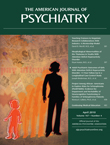The Protest Psychosis is a passionate condemnation of the relationship between psychiatric diagnosis and race. It is deliberately provocative—"the book explores the processes through which American society equates race with insanity"—with the aim, it seems, of shocking readers into recognizing their own underlying racism. The tale it tells is grim. In the early 20th century, "schizophrenia" was a problem of white middle-class women. They needed help, but above all they needed kindness, and the institutions built to house them existed not to protect others from them but to restore them to themselves. Most psychiatrists are aware that DSM-III narrowed the category of schizophrenia. Patients left within it after 1980 were sicker, crazier, and more violent than those who fit within its earlier capacious boundaries. Many may not realize that before the category was narrowed, back in the days when psychoanalysis still dominated psychiatry, African American men came to represent the problem of schizophrenia in popular culture and, arguably, in psychiatry. Advertisements for antipsychotic medications in the psychiatric journals showed angry black men or even just African tribal symbols. Metzl attributes this association to civil rights-era anxieties about racial protest, and he insists that with this history, the category of schizophrenia itself is racist: "Diagnosis is an inherently political interaction because diagnostic terminology is inherently politicized…even a correct diagnosis is always already a misdiagnosis." In electronic searches of articles in the New York Times, the Chicago Tribune, and the Los Angeles Times from the late 1950s on, "schizophrenic" and "schizophrenia" repeatedly draw associations with "Negro" and "black."
It is demonstrably true that even in recent decades, psychiatrists misdiagnose African Americans with schizophrenia when they would be more properly diagnosed with affective disorder. It is also demonstrably true that our jails are our largest psychiatric hospitals and that many housed within them are African American. The Protest Psychosis tells the story of Ionia State Hospital for the Criminally Insane, an old psychiatric institution that shifted from the care of presumed-harmless white women to the care of presumed-dangerous African American men to a prison, a trajectory that Metzl understands to represent the broader American understanding of our most devastating mental illness.
There is, however, another dimension to this story that Metzl does not tell. For the past 20 years, psychiatric epidemiology has gathered evidence that stress and trauma increase the chances that someone will develop schizophrenia. Being born poor increases one's risk of schizophrenia, as does living in an urban setting, being retarded, and being an immigrant. If one has a dark skin, one's risk of schizophrenia increases as one's neighborhood whitens, a disturbing finding known as the "ethnic density" effect. The risk of developing schizophrenia among African Caribbeans who have migrated from Jamaica to the United Kingdom is as much as 15 times higher than that among the local whites; the effect holds true for black-skinned Surinamese who have immigrated to the Netherlands. Recent research has found an association between trauma and schizophrenia so powerful that some European psychiatrists argue that trauma lies behind every psychosis. (These robust data are summarized in a recent collection edited by Morgan et al. [1]). There is something about social defeat that gets under the skin and—in those who are vulnerable—can literally drive someone crazy.
Why would a good liberal not consider this dimension of the story? Metzl simply ignores the research. "From the perspective of contemporary psychiatry, it makes no sense that schizophrenia is over-diagnosed in African Americans." This is not a problem unique to him. I have a student conducting an ethnographic study of the African Caribbean community in the United Kingdom, and again and again, academics in this country explain to her that the rate is the result of clinician bias—an explanation that even members of that community do not believe. The African Caribbeans in London attribute their high rates of schizophrenia to the experience of living in poverty with a history of racism and slavery. Why is it that racial prejudice—which certainly exists—seems so much more palatable as an explanation for high rates of illness than the effects of social inequality?
Perhaps the explanation is that it is so morally distressing to confront the costs of human social life. This, after all, was the story of the 1965 Moynihan report—a report that documented the real challenges of African American life in the inner city and was roundly criticized as racist and dismissed. Racial prejudice, after all, is something that readers of a book like this can act on or at least believe they can alter. Deep social inequality that leaves its marks on the body and mind is far more difficult to uproot. There is little doubt, however, that those marks are real.
Racism may be a problem for psychiatric interpretation. But it is also a psychiatric problem for those who struggle beneath its burden.

